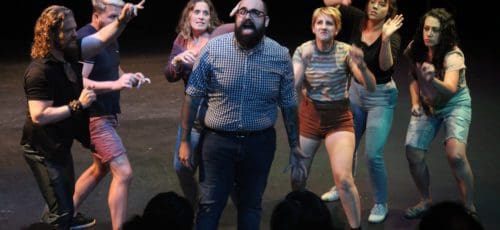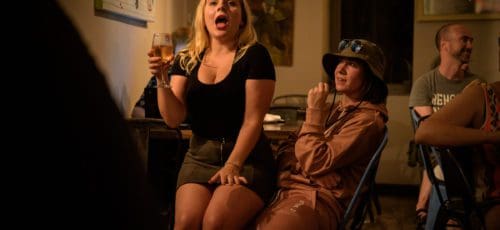Fighting Back: Interview with Neighborhood Fringe artist Colie McClellan
“It’s infuriating to realize the enormity of intimate partner violence, the prevalence it has in our society—I couldn’t not do something about that.”

Colie McClellan in They Call Me Arethusa
Stories of abuse and sexual violence against women run throughout Ancient Greek mythology. Actor and writer Colie McClellan came across these stories countless times while majoring in classics at the College of Charleston. In her one-woman play, They Call Me Arethusa, Colie weaves Greek mythology with stories of real, modern women who have experienced partner violence. They Call Me Arethusa runs throughout the 2014 Fringe Festival (September 5–20 at Pig Iron School Studio One). We caught up with Colie to find out more.
FringeArts: What inspired the creation of They Call Me Arethusa?
Colie McClellan: Once you’ve experienced dating violence, it’s like you enter a club. This club is made up of women who all have their own experience to relate. Sometimes these are small instances. Others extend over the course of a lifetime, recurring again and again. Women share with you the secrets they don’t share with anyone else, because once you’ve experienced it, you understand. What I’m seeking to do is bring these stories to light, for the world to see. It’s infuriating to realize the enormity of intimate partner violence, the prevalence it has in our society. I couldn’t not do something about that.
I didn’t know what the piece would look like when I started talking to women, started doing research. I just knew that I wanted to record and honor their stories. At first I envisioned a piece that used a lot of different forms of expression from the women: poems, stories, songs. I also had the idea to bring in themes from pop culture to represent the pressure we place on women to perform a certain way. Those things didn’t make the cut. The creative team and I felt that it drew too much away from our mission of focusing on the survivors, their stories, and how often we diminish or romanticize abuse.
FringeArts: What makes theater the right artistic medium to explore these issues?
Colie McClellan: Theater is the right artistic medium for me to explore these issues because it’s my artistic medium. Theater is about sharing stories and reflecting on human experiences. And I’ve been doing theater since I was a kid. It all makes perfect sense for me, and, again, I couldn’t not do it this way.
FringeArts: Has creating this play made you think differently about partner violence?
Colie McClellan: There are a few things that creating and performing this play have made me think about differently: A. Oh yeah, people don’t talk about intimate partner violence. This sounds obvious, because it’s the reason I wanted to do the thing, but I can be so steeped in the telling of these stories that I forget that other people aren’t talking about this. When certain audience members are stunned or shocked, it sometimes still surprises me. You can feel it from them while the piece is happening. I’ve built in soothing moments, moments of reprieve to help with that sting, but it is a lot to take in, and I don’t let anyone off the hook.
B. Everyone has a story. Every single time I’ve performed this piece, at least one person from the audience has approached me and said that they, or their sister, or their girlfriend, or their mom, or their grandmother, or their friend is a survivor of intimate partner violence. Some of the women who experienced it firsthand would leave right after the show and send me messages later. Their messages kept—and keep—me doing this. I’m doing this for them.
C. Some people won’t ever get it. They also get upset with me for sharing these stories, like I’m making them confront issues that they wish they could keep ignoring. I could write a whole essay about this. I’ll keep it short and simple: I don’t like it either! But ignoring things doesn’t make them go away.
FringeArts: Why did you decide to include Greek mythology?
Colie McClellan: I was a classics major in undergrad. The stories of the women who are chased and attacked and abused, they are all over the place. I wanted to frame the testimonials with something universal—these myths that reflect the way we diminish abuse today.
I like that the stories are a bit removed from the audience. It gives them a chance to breathe between these heavy, hefty testimonials. I also like that the mythological storytelling lulls them into a sense of security, so you can draw them back in a little before continuing to the next heavy hitting piece.
FringeArts: Is there anything you would like the audience to know before your show?
Colie McClellan: I’d like for the audience to come with open minds and ready hearts. I’m not out to prove anything; I’m just seeking to share and hopefully empower.
Thank you, Colie!
Fringe Festival tickets are already on sale! Tickets for They Call Me Arethusa available online.
They Call Me Arethusa
55 minutes
Opening night $10
All other performances $20
Pig Iron School Studio One
1417 North 2nd St
Wheelchair accessible
Sept 5 at 10:30pm
Sept 6 + 7 at 3pm
Sept 10 + 11 at 8pm
Sept 12 at 10pm
Sept 13 at 2pm + 6:30pm
Sept 14 at 5:30pm
Sept 15 at 9pm
Sept 17 + 18 at 6:30pm
Sept 19 at 8pm
Sept 20 at 2pm + 8pm
—Miriam Hwang-Carlos


